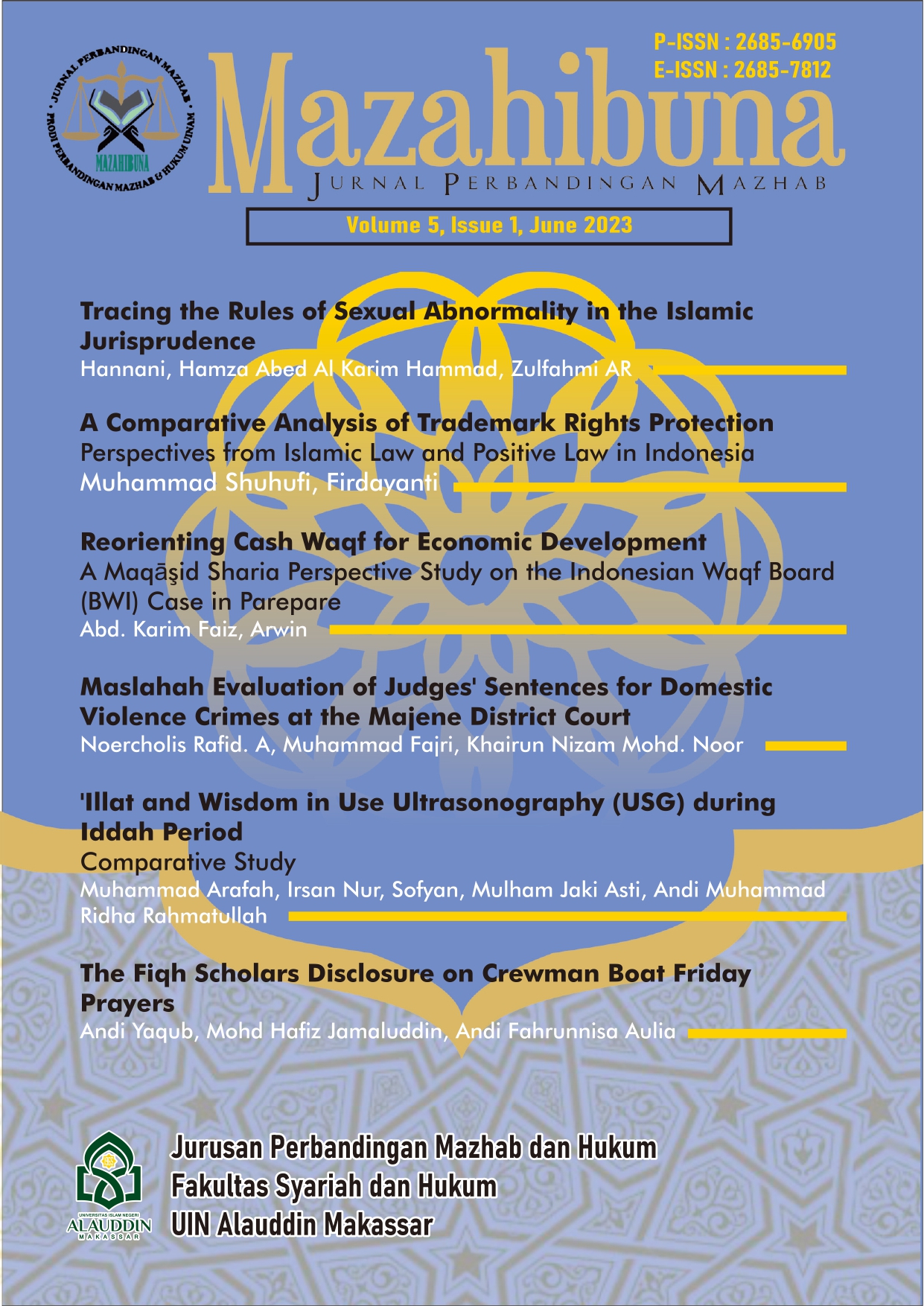Maslahah Evaluation of Judges' Sentences for Domestic Violence Crimes at the Majene District Court
Abstract
The study aimed to analyze the factors that contributed to the judge's lenient sentence towards a defendant charged with domestic violence at the Majene District Court. Additionally, the study sought to examine the maslahah value inherent in the judge's decision. The study conducted was normative research that involved analyzing the decisions made by judges. Additionally, interviews were conducted with multiple judges to gain insights into their decision-making processes. The study employed a normative syar'i approach to examine judges' decisions by utilizing maslahah analysis from Islamic legal theory. According to the study's findings, the judge's decision was influenced by the maslahah value, which prioritized the restoration of the perpetrator's household. This was due to the perpetrator's expression of regret and the establishment of peace between the involved parties. The statement suggests that there is a comparison between the obligation of maintaining a household and the imposition of prison sentences ranging from 1-10 years on perpetrators who are responsible for victimizing their wives. The imposition of prison sentences can have negative consequences for both the offender and society as a whole, as it impacts their ability to meet basic needs.
References
Peraturan Mahkamah Agung Nomor 3 Tahun 2017 Tentang Pedoman Mengadili Perkara Perempuan Berhadapan dengan Hukum, (2017).
Al-Salām, ’Izz al-Dīn ’Abd al-’Azīz bin ’Abd. (2000). Al-Qawā’id al-Kubrā al-Mawsūm bi Qawā’id al-Ahkām fī Iṣlāh al-Anām. Dar al-Qalam.
Al-Syatibi, A. I. (2003). al-Muwafaqat fi Ushul al-Syari‘ah Juz II. Maktabah al-Taufiqiyah.
Alang, A. R., & Solaiman, E. (2021). Analisis Putusan Hakim Dan Pembuktian Tindak Pidana Kekerasan Dalam Rumah Tangga (KDRT). Alauddin Law Development Journal, 3(1), 75–92. https://doi.org/10.24252/aldev.v3i1.14637
Alfitri. (2020). Protecting Women from Domestic Violence: Islam, Family Law, and the State in Indonesia. Studia Islamika, 27(2). https://doi.org/10.36712/sdi.v27i2.9408
Alimuddin, H., & Maulidah, T. A. (2021). Implication of Local Wisdom in Islamic Law Compilation Legislation. Mazahibuna: Jurnal Perbandingan Mazhab, 3(2), 143–158. https://doi.org/10.24252/mh.v3i2.24982
Asiah, N. (2020). Maslahah Menurut Konsep Imam Al Ghazali. DIKTUM: Jurnal Syariah Dan Hukum, 18(1), 118–128. https://doi.org/10.35905/diktum.v18i1.663
Undang-Undang tentang Penghapusan Kekerasan dalam Rumah Tagga, (2004).
Djannah, F., & Rizal, M. (2020). Law Enforcement Against Perpetrators of Domestic Violence in terms of Legislation and Islamic Law. Britain International of Humanities and Social Sciences (BIoHS) Journal, 2(1), 109–119. https://doi.org/10.33258/biohs.v2i1.155
Faizal, L. (2019). A Transformation of Islamic Law in Legislation of Domestic Violence (PDKRT) Law in Indonesia. Al-’Adalah, 15(1), 1. https://doi.org/10.24042/adalah.v15i1.2509
Fyzee, A. A. . (1963). A Modern Approach to Islam, Bombay: Asia Publishing House.
Hanafi, H., Hidayatullah, H., & Tamjidnor, T. (2022). Domestic Violence: Comparison between Islamic Law and Domestic Violence. International Journal of Social Science, Education, Communication and Economics (SINOMICS JOURNAL), 1(1), 1–8. https://doi.org/10.54443/sj.v1i1.1
Iqbal. (2021). Sosialisasikan Hak-Hak Perempuan di Majene, Arwan Aras Ingatkan Angka Perkawinan Anak Sulbar Masih Tinggi. SULBARONLINE.COM.
Ja’far, A. K., & Hermanto, A. (2021). Reinterpretation Of The Rights And Duties Of Contemporary Husbands And Wives. Samarah, 5(2), 648–667. https://doi.org/10.22373/sjhk.v5i2.9124
Jalili, A. (2021). Teori Maqashid Syariah Dalam Hukum Islam. TERAJU, 3(02). https://doi.org/10.35961/teraju.v3i02.294
Jamhuri, & Rafi’ah. (2019). Upaya meminimalisi kasus KDRT di Aceh: Studi kasus P2TP2A provinsi aceh. Samarah, 3(1), 90–115. https://doi.org/10.22373/sjhk.v3i1.4954
Mahfud, M., & Rizanizarli, R. (2021). Domestic Violence against Women in Indonesia: The Recent Domestic Violence Elimination Law Analysis. Fiat Justisia: Jurnal Ilmu Hukum, 15(4), 385–398. https://doi.org/10.25041/fiatjustisia.v15no4.2276
Mahkamah Agung. (2019). Putusan Hakim PN Majene Nomor 56/Pid.Sus/2019/PN Mjn.
MKRI, H. (2022). Menguji Konstitusionalitas Bentuk Kekerasan Psikis dalam UU KDRT.
Ningrum, W. T. P., & Mas’udah, S. (2021). Family conflicts and the violence of unemployed husbands against their wives acting as the main breadwinner. Jurnal Sosiologi Dialektika, 16(1), 76. https://doi.org/10.20473/jsd.v16i1.2021.76-85
Putri, N. N., & Suyanto, H. (2021). Legal Protection for Victims of Domestic Violence: The Pandemic of Covid-19. UNIFIKASI : Jurnal Ilmu Hukum, 8(1), 95–104. https://doi.org/10.25134/unifikasi.v8i1.3876
Ridlwan, M. K. (2015). Kekerasan dalam Rumah tangga (Analisis Ketentuan UU PKDRT, al-Qur’an dan Hadits tentang Nushūz).
Risdianto. (2021). Hukuman Terhadap Tindak Pidana Kekerasan dalam Rumah Tangga Menurut Hukum Islam. Islamic Review: Jurnal Riset Dan Kajian Keislaman, 10(April), 59–76. https://doi.org/10.35878/islamicreview.v10.i1.266
Sharma, A., & Borah, S. B. (2022). Covid-19 and Domestic Violence: an Indirect Path to Social and Economic Crisis. Journal of Family Violence, 37(5), 759–765. https://doi.org/10.1007/s10896-020-00188-8
Wahab, R. (2006). Kekerasan dalam Rumah Tangga: Perspektif Psikologis dan Edukatif. UNISIA, 29.
Wardhani, K. A. P. (2021). Perlindungan Hukum terhadap Perempuan Korban Kekerasan Dalam Rumah Tangga (KDRT) pada Tingkat Penyidikan berdasarkan Undang-Undang No. 23 Tahun 2004 tentang Penghapusan Kekerasan Dalam Rumah Tangga (UUPKDRT). Jurnal Riset Ilmu Hukum, 1(1), 21–31. https://doi.org/10.29313/jrih.v1i1.70
Zuhdi, S., Kuswardani, Prakosa, A. L., Kurnianingsih, M., Astuti, W., & Rahman, R. A. (2019). Domestic violence as a consequence of nusyuz under the islamic law and legislation of Indonesia. Humanities and Social Sciences Reviews, 7(2), 340–348. https://doi.org/10.18510/hssr.2019.7240
Copyright (c) 2023 Noercholis noe, Muhammad Fajri, Khairun Nizam Mohd. Noor

This work is licensed under a Creative Commons Attribution 4.0 International License.

This work is licensed under a Creative Commons Attribution 4.0 International License.
Authors who publish with Mazahibuna: Jurnal Perbandingan Mazhab agree to the following terms:
- Authors retain copyright and grant the Mazahibuna: Jurnal Perbandingan Mazhab right of first publication with the work simultaneously licensed under Creative Commons Attribution License (CC BY 4.0) that allows others to share the work with an acknowledgment of the work's authorship and initial publication in this journal.
- Authors can enter into separate, additional contractual arrangements for the non-exclusive distribution of the published version of the work (e.g., post it to an institutional repository or edit it in a book), with an acknowledgment of its initial publication in this journal.
- Authors are permitted and encouraged to post their work online (e.g., in institutional repositories or on their website) before and during the submission process, as it can lead to productive exchanges, as well as earlier and greater citation of published work.

